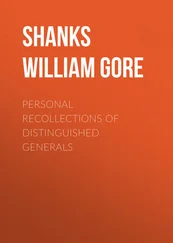What we heard probably penetrated our consciousness, like the distant surf of a spring high tide, but our lives remained untouched by it. We took our meals each day when the gong sounded, every day we saw the same faces, the same English countryside, the same sky: we read, we played, we wrote, we meditated day after day as if there were nothing more natural in the world. [56] Ferdinand Heim, ‘Seine Kalkulation’, BA/MA MSg 1/3149 p. 71.
The calm, peaceful atmosphere of the estate, combined with endless free time, allowed the generals time to reflect on the war and their experiences of it. [57] See Crüwell’s statement, Document 8, 16.5.1943.
For the first time in their lives the majority were associating with many colleagues of equal rank who had shared much the same experiences and it was not humanly possible to remain silent on major subjects of common concern. How would the war turn out? How could the defeats be explained? Had the Germans brought upon themselves a special guilt?
Heim wrote of Trent Park:
We often shook our heads about our people, who seemed to be committing suicide, and at times we raged over a leadership without accountability which was leading this people to annihilation, riding to the death the mad idea of their intense heroism… accordingly we saw from a distance the horrifyingly irretrievable situation, apparently with no way out. Then we would retire once more to our ‘monastic cells’, or into the ‘monastery garden’ – pious brothers who had once been warriors… We tried to understand how it had come about, where its origins and errors lay, who was responsible. One thing we saw clearly: to lose two World Wars in a lifetime seemed like a judgement of God. [58] Ferdinand Heim, ‘Seine Kalkulation’, BA/MA MSg 1/3149.
It is natural to ask whether the inmates of Trent Park, and at the other two centres, knew that they were being spied upon. The authenticity of the protocols might be doubted if the generals suspected that the British were actively tapping their knowledge, for it would then be plausible for them to lace their conversations with disinformation. British methods of information gathering were by no means unknown in Germany. Before his transfer abroad in October 1940, the fighter pilot Franz von Werra was for a short time at Trent Park. After his escape from Canada, he reported extensively on British interrogation methods. [59] Telegram 27.1.1941 No. 245 RLM Attaché Group, PAAA, R41141 (according to Rüdiger Overmans).
On 11 June 1941 Ausland-Abwehr issued guidelines for the conduct of Wehrmacht personnel in British captivity, warning expressly of stool pigeons masquerading in German uniform, and hidden microphones. It was pointed out emphatically that the enemy had succeeded in obtaining valuable information by such means. [60] OKW A Ausl/Abw-Abt. 4091/41g, 11.6.1941, BA/MA, RM 7/3137.
The British protocols show that most German prisoners disregarded these warnings very quickly, irrespective of how hard it had been drummed into them, and gossiped habitually with their colleagues about military secrets.
The conversations of NCOs contain repeated reference to the National Socialist propaganda film Kämpfer hinter Stacheldraht (‘Warriors behind Barbed Wire’) [61] See e.g. SRN 4677, March 1945, TNA WO 208/4157. For the various warnings not to betray information in captivity see for example ‘Extract from SR Draft No 2142’, TNA WO 208/4200.
aimed at preventing careless talk. Yet in the same breath they would then proceed to enlighten their colleagues on what they had deliberately withheld from the interrogation officers, [62] See for example, SRN 185, 22.3.1941, TNA WO 208/ 4141; SRN 418, 19.6.1941; SRN 462, 28.6.1941, both TNA WO 208/4142; SRN 741, 10.1.1942 TNA WO 208/4143.
thus dictating their secrets directly into British microphones, so to speak. Most German PoWs gave no thought to the possibility of their being overheard, or they would not have incriminated themselves by discussing their involvement in war crimes. [63] See for example SRM 741, 4.8.1944, TNA WO 208/4138.
Only in a single case is it known for certain that prisoners discovered hidden microphones. [64] ‘Extract from Draft No. 2148’, 5.3.1944, TNA WO 208/4200.
Officers were no different to other ranks in this respect. Oberst Kessler said that he had withheld from the intelligence officer at an interrogation centre details of his attitude to Nazism, then told Oberst Reimann what his attitude was (Document 28). There are numerous such examples which show that even senior officers at Trent Park fell into the craftily designed CSDIC (UK) trap.
To prevent the monotony of camp life causing the flow of talk to dry up, the British supplied falsified newspapers and magazines to provoke ever-more lively debate. Trent Park intelligence officers took selected prisoners on long excursions. This method succeeded in making General Crüwell more forthcoming. He had been initially ‘singularly uncommunicative’ but after a day out sightseeing he spoke for the first time about his impressions, then on general matters and finally on military questions. [65] Crüwell noted in his diary on 15.10.1942 (Vol. 2, p. 4) that he had had two days out with Colonel Richardson of the War Office, one to Hampton Court and the other to Windsor and Eton.
In the course of time he opened up to ‘one of our best interrogators’. Especially valuable were Crüwell’s conversations with Oberleutnant zur See Wolfgang Römer, commander of U-353 sunk in the North Atlantic on 16 October 1942. Roemer responded to his enquiries by describing U-boat tactics which the British found to be of inestimable value. [66] ‘Notes on the Extraction of Information from PoWs’, MI19, 24.6.1943 TNA WO 208/3438. In mid-June Churchill forbade the ‘nonsense’ of ‘enemy generals being taken on sightseeing tours’. These were then severely restricted without his prior permission. This led to a fall-off in new information, and after CSDIC (UK) complained in March 1944, the ban was relaxed. See reports 11.6.1943, 15.6.1943 and 2.3.1944 in TNA PREM3/363/3.
When General von Thoma was made Senior German Officer in June 1944, he made it his custom to get new arrivals to speak out on their experiences. No stool pigeon could have done it better.
Generaloberst von Arnim tried in vain to instil a greater degree of watchfulness over private discussions at Trent Park. On 9 July 1943 in his capacity as Senior German Officer (Document 12) he urged caution in what was said – Trent Park was a former interrogation centre and one had to take into account that microphones might be hidden there. For this reason alone one should not hold conversations which might be of propaganda value to the enemy. On 15 August he renewed his appeal. He suspected that Lord Aberfeldy listened-in to prisoners’ conversations from his window, and that some of the personal valets were collaborating with the British (neither true), and that one must therefore exercise the greatest caution. [67] GRGG 72, 14–20.8.1943, TNA WO 208/4363.
His appeal fell on deaf ears. The prisoners would not be muzzled and chatted gaily about politics and military affairs. Generalleutnant Neuffer considered ‘the stories about eavesdropping’ to be ‘utter stupidity’ [68] ‘Extract from SR Draft 5915’ (GG), 16.8.1943, TNA WO 208/3473.
while Oberstleutnant Köhncke was of the opinion that the prisoners had the right ‘to talk about political things – we are, after all, not children.’ One should be grateful to find oneself amongst one’s peers, amongst people with some experience of life, with different points of view, he went on, and this was not the same kind of thing at all as gossiping with young lieutenants. [69] ‘Extract from SR Draft 5917’ (GG), 15.8.1943, TNA WO 208/3473.
Thoma concluded, ‘They have such a good intelligence service that they don’t need to listen to us chatterboxes.’ [70] ‘Extract from SR Draft 5914’ (GG), 16.8.1943, TNA WO 208/3473.
Читать дальше
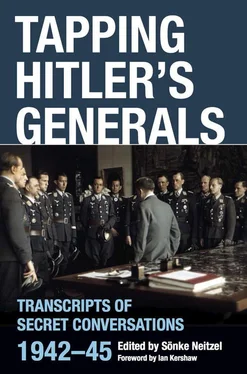

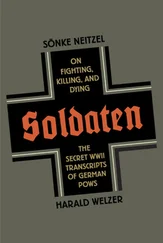
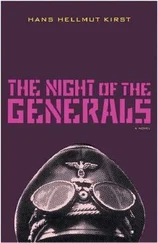


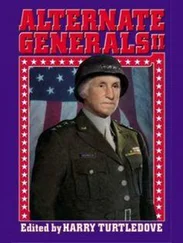

![Traudl Junge - Hitler's Last Secretary - A Firsthand Account of Life with Hitler [aka Until the Final Hour]](/books/416681/traudl-junge-hitler-s-last-secretary-a-firsthand-thumb.webp)



